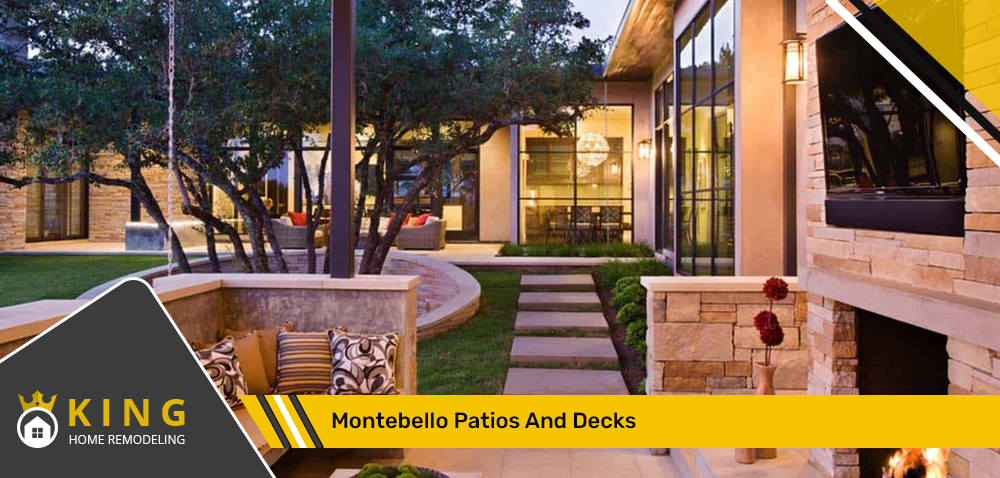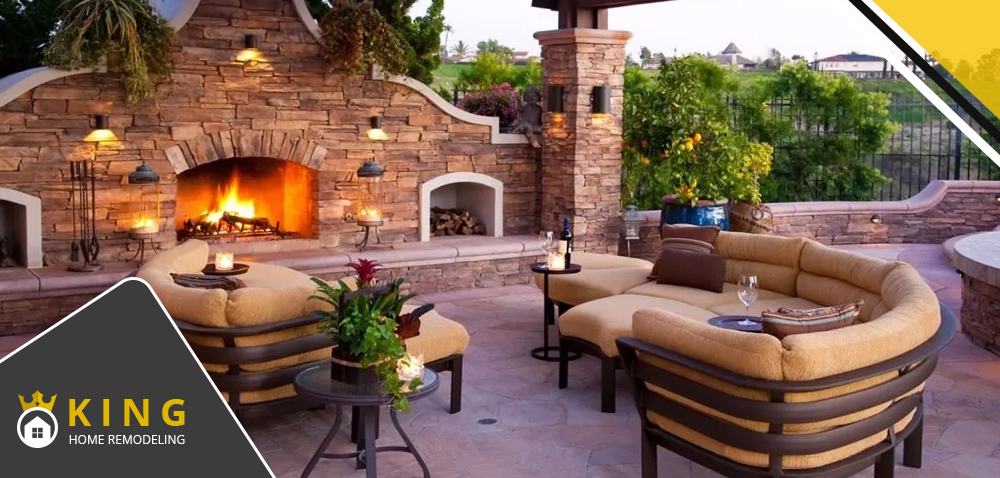Installing patio and decks should be done with the help of professionals. King Home Remodeling is one of the leading names in the industry, ensuring that the patio is installed the way you want. Here is the process that we follow

The first step involves discussing your design preferences and needs with our team. Get the help to plan the layout, materials, and features of your patio or deck to ensure it meets your aesthetic and functional requirements. Get in touch
In Montebello, you need to obtain permits and approvals from the local authorities before construction begins. You will get complete assistance in this process, ensuring compliance with building codes and regulations
The installation area is prepared by clearing any vegetation, grading the ground, and ensuring proper drainage to prevent water accumulation. This step provides a stable foundation for your patio or deck
The actual construction phase includes framing, decking, railing installation, and any additional features like lighting or built-in seating. High-quality materials and craftsmanship are used to ensure a durable and visually appealing result.
Once construction is complete, the finishing touches are added, such as staining or sealing the wood, or laying pavers. A final inspection ensures that everything is up to code and meets your expectations. Cleanup is done to leave your outdoor space ready for enjoyment.
Choosing the right materials in materials is important for building patios and decks. Here are some of the options that you should try out
| Wood |
|
| Composite Decking |
|
| Stone |
|
| Concrete |
|
| Brick |
|
| Tile |
|
| Metal |
|
| Vinyl |
|
| Rubber |
|
| Recycled Materials |
|
| Glass |
|
| Railing Materials |
|

Repairs are important for your deck and patios. Timely repairs ensure that your patios and deck retain their beauty and functionality. Here are some of the repair services that we offer for your decks and patios.
Over time, the surface of a deck or patio can deteriorate, crack, or become uneven. Resurfacing involves repairing or replacing the top layer of the deck or patio, which can improve its appearance and safety
Damaged or rotten deck boards should be promptly replaced to maintain the structural integrity and safety of the deck. This repair may involve removing and disposing of old boards and installing new ones
Patio pavers can become uneven or settle over time, creating tripping hazards. Repairs may include lifting and leveling pavers, replacing broken or damaged ones, and addressing any underlying issues with the base material
Deck and patio railings can loosen, rot, or become damaged. Repairs may involve securing loose railings, replacing damaged parts, or upgrading to more durable railing materials
If your deck or patio has stairs, repairs may be needed to fix loose or damaged steps, railings, or handrails. Ensuring the safety of stairs is crucial.
Over time, the structural components of a deck, such as posts, beams, and footings, can weaken due to moisture, rot, or pests. Structural repairs are essential to maintain the stability and safety of the deck or patio.
To prevent water damage and prolong the life of your deck or patio, it’s important to periodically apply waterproofing sealants. This helps protect against moisture infiltration and weathering.
Patio expansion joints can deteriorate or become loose, causing tripping hazards. Repairing or replacing these joints is necessary to maintain a safe and visually appealing patio.
If your patio or deck is sinking or settling unevenly, it may require adjustments to the foundation or support system to restore its level and stability
Routine cleaning and stain removal can enhance the appearance of your deck or patio. This may include pressure washing, removing mold or mildew, or cleaning stains from spills.
In Montebello, pests like termites can damage wooden decks and patios. Pest inspections and repairs may be necessary to address infestations and prevent further damage
Your Montebello Patios and decks will need regular maintenance. Here are some of the services you get from our Montebello remodeling contractors:
| Work | Frequency | Tasks |
|---|---|---|
| Regular Cleaning And Inspection | At least once a year, ideally before and after the winter season | Clean the surface, remove debris, inspect for loose boards, nails, or screws, and check for signs of rot or pest damage |
| Sealing And Staining | Every 2-3 years for wooden decks. | Apply a fresh coat of sealer or stain to protect against moisture, UV rays, and wear. Ensure proper surface preparation before application. |
| Paver Maintenance | Regularly throughout the year. | Remove weeds, moss, or algae from between pavers, relevel uneven pavers, and replace any damaged or sunken pavers as needed. |
| Railing And Baluster Inspection | Annually | Inspect for loose or damaged railing components. Tighten or replace hardware, and refinish or paint as necessary |
| Structural Inspections | Every 3-5 years | Engage a professional to inspect the structural integrity of the deck or patio, including posts, beams, and footings. Address any issues promptly. |
| Waterproofing | Every 2-3 years | Reapply waterproofing sealant to protect against water damage, particularly for wooden decks. |
| Pest Control | As needed | Schedule regular pest inspections and treatments, especially if you have a wooden deck that may be susceptible to termites or other pests. |
| Winterization | Annually before winter | Prepare your deck or patio for winter by removing furniture and planters, ensuring proper drainage, and protecting surfaces from snow and ice damage. |
| Professional Maintenance Contracts | As agreed upon with the homeowner | Get help with regular inspections, cleaning, repairs, and seasonal maintenance on your behalf. |
| Emergency Repairs | As needed | Be prepared to address unexpected issues promptly to prevent further damage. Have a plan for emergency repairs and access to professional services |
These set of questions & answers by our experts can help get a better understanding of Patio Decks
A patio is typically a ground-level outdoor space made of concrete, pavers, or stone, while a deck is a raised platform made of wood or composite materials.
Permit requirements vary by location and the size of the project. Check with your local building department or a professional contractor for guidance.
Common materials for decks include wood, composite, and PVC, while patios are often made from concrete, pavers, brick, or natural stone
Wood decks require more maintenance (staining, sealing) but can be less expensive initially. Composite decks are low-maintenance but may have a higher upfront cost.
Consider your budget, available space, intended use, local climate, and aesthetics when designing your outdoor space.
Yes, many features can be added after the initial installation, but it’s often easier to plan for them during the design phase.
A patio is typically a ground-level outdoor space made of concrete, pavers, or stone, while a deck is a raised platform made of wood or composite materials.
Permit requirements vary by location and the size of the project. Check with your local building department or a professional contractor for guidance.
Common materials for decks include wood, composite, and PVC, while patios are often made from concrete, pavers, brick, or natural stone
Wood decks require more maintenance (staining, sealing) but can be less expensive initially. Composite decks are low-maintenance but may have a higher upfront cost.
Consider your budget, available space, intended use, local climate, and aesthetics when designing your outdoor space.
Yes, many features can be added after the initial installation, but it’s often easier to plan for them during the design phase.
 (424)-781-9911
(424)-781-9911

It is a long established fact that a reader will be distracted by the readable content of a page when looking at its layout.

It is a long established fact that a reader will be distracted by the readable content of a page when looking at its layout.